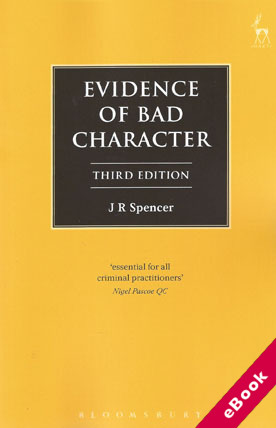
The device(s) you use to access the eBook content must be authorized with an Adobe ID before you download the product otherwise it will fail to register correctly.
For further information see https://www.wildy.com/ebook-formats
Once the order is confirmed an automated e-mail will be sent to you to allow you to download the eBook.
All eBooks are supplied firm sale and cannot be returned. If you believe there is a fault with your eBook then contact us on ebooks@wildy.com and we will help in resolving the issue. This does not affect your statutory rights.
This is the third edition of John Spencer's now well established book which seeks to explain this complex area of law for the benefit of judges, criminal practitioners and academics teaching the law of evidence.
In the past, the rule excluding evidence of the defendant's general bad character and disposition to commit the offence was sometimes described as one of the most hallowed rules of evidence; Lord Sankey, in Maxwell v DPP, referred to it as '...one of the most deeply rooted and jealously guarded principles of our criminal law.'
In reality it was not particularly ancient, and in recent years was increasingly attacked. On technical grounds the body of law surrounding it was criticised as over-complicated and inconsistent, and more radical critics condemned it as unduly favourable to the guilty. In response to this, the law was completely recast in Part II of the Criminal Justice Act 2003.
This book, now updated to take into account a raft of new cases, offers a thorough analysis of the bad character provisions of the Criminal Justice Act 2003 in the light of the way in which they have been interpreted by the courts.